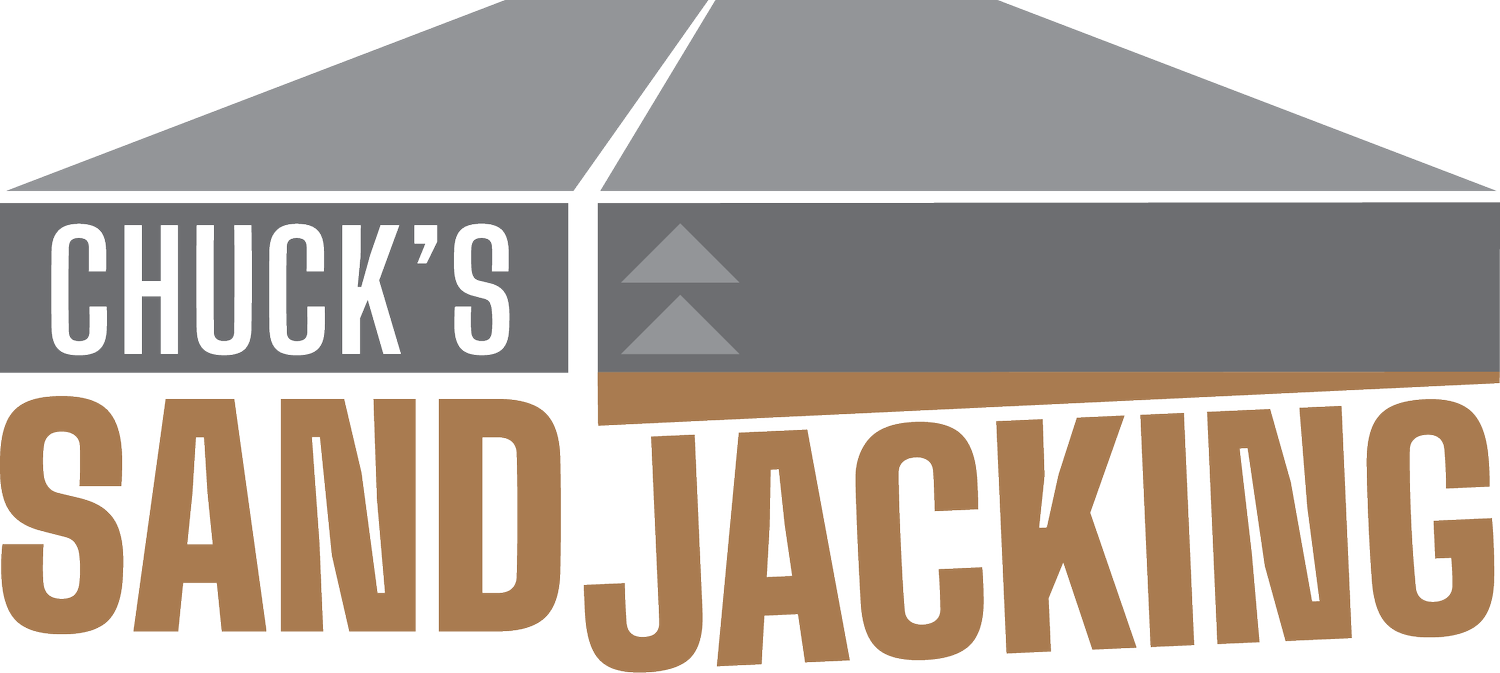
Comparison of Concrete Lifting Methods
Sandjacking vs Mudjacking vs Foaming
Sandjacking, mudpumping (mudjacking), and foaming (polyurethane foam injection) are all techniques used to lift and level settling concrete slabs.
The Chuck’s Sandjacking’s unique, patented process provides several distinct advantages: Stability, Precise lift, Dryness and Longevity.
Please review the advantages of our Sandjacking process compared to mudpumping and foaming:
Moisture Control and Drying
ADVANTAGE – Chuck’s Sandjacking:
Uses specifically dried sand, preventing additional moisture intrusion and buildup under the slab.
Helps dry out the sub-base and underlying soils over time.
CONTRAST:
Mudpumping introduces a wet slurry (cement, water, and soil), which introduces moisture and may cause further settlement or frost heave.
Foaming is mostly dry but does not actively reduce moisture in the subgrade like our patented sandjacking process.
NEITHER mudpumping or foaming completely fills the voids, so water can again find its way under your slab and keep everything saturated.
Compaction and Stability
ADVANTAGE – Chuck’s Sandjacking:
Our specifically dried sand is mechanically compacted beneath the slab, filling voids and creating a very stable base.
Because it is dry, the sand fills the voids and compacts immediately. Our unique, patented Sandjacking process reduces the risk of future settling or voids forming, therefore reducing the possibility of water storage.
CONTRAST:
Since mudpumping introduces water in the process, the mixed materials will likely shrink over time.
Foam cannot fill voids completely; therefore, water will likely fill the empty voids.
Environmental and Material Safety
ADVANTAGE – Chuck’s Sandjacking:
Involves only our specifically dried, inert materials (sand) - no chemicals or synthetic components.
More environmentally friendly and non-toxic.
Contrast:
Foaming involves chemical reactions and synthetic materials (polyurethane), which can emit toxic gases and may be less desirable in eco-sensitive environments.
Traditional mudjacking is more natural than foam, but it can result in slab settling in our harsh freeze-thaw weather cycles.
Long-Term Performance
ADVANTAGE – Chuck’s Sandjacking:
High durability and minimal degradation over time.
Resists erosion and void formation better than mud or foam.
Water accelerates slab settling. No water – NO SETTLING!
CONTRAST:
Neither foam or mud fills voids completely, so water can accumulate under your slab again.
Precision and Control
ADVANTAGE – Chuck’s Sandjacking:
Allows for very precise slab lifting, as our method can be fine-tuned during the unique, patented process. Chuck's Sandjacking uses mechanical methods to precisely raise concrete slabs BEFORE introducing the specifically dried sand to fill the voids and provide maximum stability.
CONTRAST:
Foaming and mudpumping don’t allow for the precise lifting provided by Chuck’s Sandjacking process.
Foam expands rapidly and can over-lift (too high) if not carefully controlled.
Mudpumping is less precise due to slurry spread.
Low Pressure vs High Pressure
ADVANTAGE – Chuck’s Sandjacking:
Following the mechanical lifting of the slab, our specifically dried sand is placed using low air pressure, allowing precise and complete filling of voids.
CONTRAST:
Foaming uses higher pressure, which lends to unpredictability and can cause overfilling/overlifting.
Mudpumping uses higher pressure, which can cause slab fractures and slab shifting.
Side-by-side Comparison Table:
Feature
Sandjacking
Mudpumping
Foaming
Moisture Control
Excellent (dried sand)
Poor (wet slurry)
Good (oil-based)
The Process
Pneumatic (dry)
Hydraulic (wet)
Hydraulic (wet)
Stability & Compaction
Excellent
Fair (7% Organics)
(shrinks/cracks)
Fair to good (can be compressed)
Environmental Impact
Low (natural sand)
Medium
Higher (forever chemical)
Long-Term Durability
Highest
Medium
Medium (depends on soil)
Precision Lifting
High
Low
Medium
Interior Use
Very suitable
Less suitable
Suitable
Holes in slabs Very few Many – large Many – medium
Risk of Slab Damage Low Higher Moderate
Lifting Methods 30+ 1 1
Side-by-side Comparison Table:
Moisture Control
Sandjacking
Excellent (dried sand)
Mudpumping
Poor (wet slurry)
Foaming
Good (oil-based)
